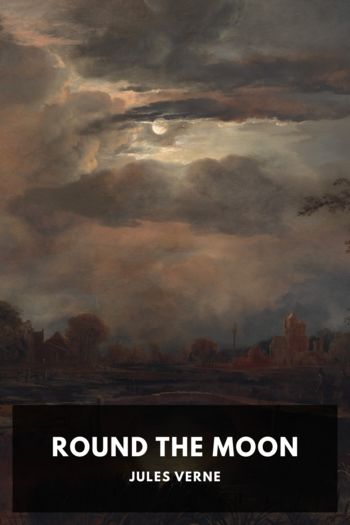Round the Moon by Jules Verne (read aloud txt) 📕

- Author: Jules Verne
Book online «Round the Moon by Jules Verne (read aloud txt) 📕». Author Jules Verne
But an unexpected circumstance occurred; the detonation produced by the Columbiad had the immediate effect of disturbing the terrestrial atmosphere, where an enormous quantity of vapour accumulated. This phenomenon excited general indignation, for the moon was hidden during several nights from the eyes of her contemplators.
The worthy J. T. Maston, the greatest friend of the three travellers, set out for the Rocky Mountains in the company of the Honourable J. Belfast, director of the Cambridge Observatory, and reached the station of Long’s Peak, where the telescope was set up which brought the moon, apparently, to within two leagues. The honourable secretary of the Gun Club wished to observe for himself the vehicle that contained his audacious friends.
The accumulation of clouds in the atmosphere prevented all observation during the 5th, 6th, 7th, 8th, 9th, and 10th of December. It was even thought that no observation could take place before the 3rd of January in the following year, for the moon, entering her last quarter on the 11th, would after that not show enough of her surface to allow the trace of the projectile to be followed.
But at last, to the general satisfaction, a strong tempest during the night between the 11th and 12th of December cleared the atmosphere, and the half-moon was distinctly visible on the dark background of the sky.
That same night a telegram was sent from Long’s Peak Station by J. T. Maston and Belfast to the staff of the Cambridge Observatory.
This telegram announced that on the 11th of December, at 8:47 p.m., the projectile hurled by the Columbiad of Stony Hill had been perceived by Messrs. Belfast and J. T. Maston, that the bullet had deviated from its course through some unknown cause, and had not reached its goal, but had gone near enough to be retained by lunar attraction; that its rectilinear movement had been changed to a circular one, and that it was describing an elliptical orbit round the moon, and had become her satellite.
The telegram added that the elements of this new star had not yet been calculated—in fact, three observations, taking a star in three different positions, are necessary to determine them. Then it stated that the distance separating the projectile from the lunar surface “might be” estimated at about 2,833 leagues, or 4,500 miles.
It ended with the following double hypothesis:—Either the attraction of the moon would end by carrying the day, and the travellers would reach their goal; or the projectile, fixed in an immutable orbit, would gravitate around the lunar disc to the end of time.
In either of these alternatives what would be the travellers’ fate? It is true they had provisions enough for some time. But even supposing that their bold enterprise were crowned with success, how would they return? Could they ever return? Would news of them ever reach the earth? These questions, debated upon by the most learned writers of the time, intensely interested the public.
A remark may here be made which ought to be meditated upon by too impatient observers. When a savant announces a purely speculative discovery to the public he cannot act with too much prudence. No one is obliged to discover either a comet or a satellite, and those who make a mistake in such a case expose themselves justly to public ridicule. Therefore it is better to wait; and that is what impatient J. T. Maston ought to have done before sending to the world the telegram which, according to him, contained the last communication about this enterprise.
In fact, the telegram contained errors of two sorts, verified later: 1. Errors of observation concerning the distance of the projectile from the surface of the moon, for upon the date of the 11th of December it was impossible to perceive it, and that which J. T. Maston had seen, or thought he saw, could not be the bullet from the Columbiad. 2. A theoretic error as to the fate of the said projectile, for making it a satellite of the moon was an absolute contradiction of the laws of rational mechanics.
One hypothesis only made by the astronomers of Long’s Peak might be realised, the one that foresaw the case when the travellers—if any yet existed—should unite their efforts with the lunar attraction so as to reach the surface of the disc.
Now these men, as intelligent as they were bold, had survived the terrible shock at departure, and their journey in their bullet-carriage will be related in its most dramatic as well as in its most singular details. This account will put an end to many illusions and previsions, but it will give a just idea of the various circumstances incidental to such an enterprise, and will set in relief Barbicane’s scientific instincts, Nicholl’s industrial resources, and the humorous audacity of Michel Ardan.
Besides, it will prove that their worthy friend J. T. Maston was losing his time when, bending over the gigantic telescope, he watched the course of the moon across the planetary regions.
I From 10:20 P.M. to 10:47 P.M.When ten o’clock struck, Michel Ardan, Barbicane, and Nicholl said goodbye to the numerous friends they left upon the earth. The two dogs, destined to acclimatise the canine race upon the lunar continents, were already imprisoned in the projectile. The three travellers approached the orifice of the enormous iron tube, and a crane lowered them to the conical covering of the bullet.
There an opening made on purpose let them down into the aluminium vehicle. The crane’s tackling was drawn up outside, and the mouth of the Columbiad instantly cleared of its last scaffolding.
As soon as Nicholl and his companions were in the projectile he closed the opening by





Comments (0)